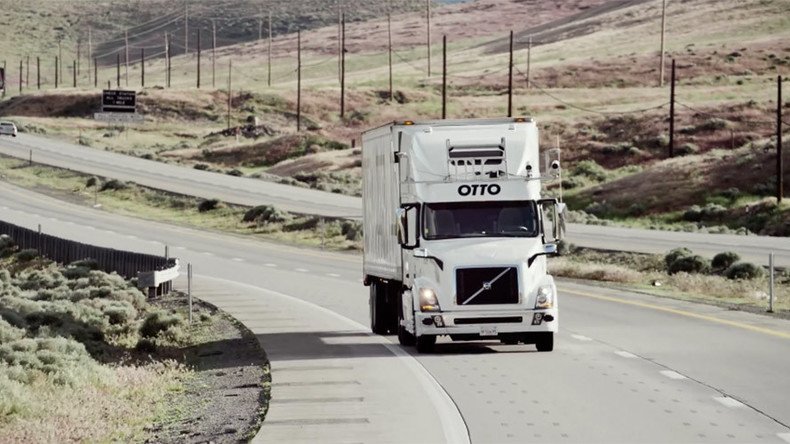Self-driving freight trucks project eyes US highway routes (VIDEO)

Driverless 18-wheeler freight trucks carrying 80,000lb of cargo could be sharing the road with you in the not too distant future, according to a new US start-up.
A start-up made up of about 40 former employees of tech and auto companies such as Google, Apple, Tesla, and Cruise Automation are developing self-driving truck technology in a bid to reduce highway fatality rates as well as meet the rising demand for truck drivers.
The new San Francisco-based company, called ‘Otto’ (as in auto-pilot, get it?), is comprised of the self-described “sharpest minds in the self-driving industry” and plans to completely reimagine the transportation industry.
“Trucks are causing an unacceptable number of fatalities every year, and truck drivers have experienced a gradual decline in quality of life as conditions worsen and expectations rise,” says Otto.
READ MORE: GM and Lyft plan to have self-driving taxis on the road in a year
Trucks carry 70 percent (14 billion tons) of all cargo transported in the US, according to the US Department of Transportation (DoT). Last year, the American Trucking Association (ATA) reported a truck driver shortage of nearly 50,000 personnel - a shortfall the ATA predicts will grow to nearly 150,000 over the next four years.
Otto hopes to target this personnel shortfall with their team of robot truckers, who will take control on highways while human drivers take a break or tackle other duties on the job.
"Our goal is to make trucks drive as humanly as possible, but with the reliability of machines," Otto co-founder and former Google self-driving engineer Anthony Levandowski told AP.
READ MORE: Google, Ford and Uber join forces, create coalition for self-driving cars
The team are in the process of testing the technology which includes a range of sensors, cameras, software and truck enhancements which together form a product that can be outfitted onto existing trucks.
For now, the technology is aimed to be used on highways, while the human driver will still be in control when driving on street sections of routes.
However, the company says it is currently years away from securing government approval.












